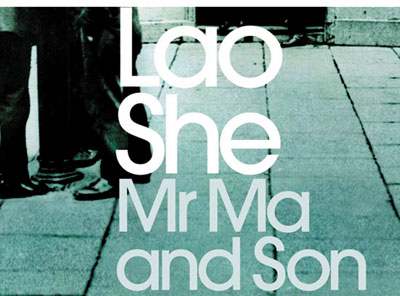|

ENGLISH-LANGUAGE editions of two entertaining and insightful novels by one of China’s most accomplished novelists, the late Lao She, will soon be on bookshelves around the country.
“Cat Country” and “Mr Ma and Son,” translated by renowned Chinese literature scholars William A. Lyell and William Dolby, respectively, are being published by Penguin China.
“Cat Country,” arguably China’s first foray into the realm of science fiction, revolves around a space traveler from China who crash-lands on an alien planet, where he discovers a country inhabited entirely by the Cat People.
Soon befriended by a local Cat Man, the traveler is introduced to a life featuring weird aspects such as the national language, Felinese; a narcotic food staple, reverie leaves; and the previous three centuries that are happily known as the “Age of Plunder” and are believed to reflect a bleak vision of turbulent 1930s China.
Pulitzer Prize-winning journalist and literary critic Ian Johnson says in the book’s introduction that Lao She stretches himself further than ever, producing one of the most remarkable, perplexing and prophetic novels of modern China.
The sarcastic humor and allegorical writing are believed to be influenced by the late author’s early experiences in London. Lao She taught Chinese at the University of London’s School of Oriental Studies from 1924 to 1929, a time when the British still viewed China and the Chinese with a strong mixture of distrust, contempt, guilt and fear after two opium wars and the Boxer Rebellion (1900).
It was there that Lao She began his career as a writer of patriotic but complex fiction about contemporary China, writes the University of London’s senior Chinese literature lecturer, Julia Lovell, in the introduction of “Mr Ma and Son.” Lovell calls the work “the first Chinese novel to confront directly British racism toward China.”
Based on Lao She’s London experiences, the novel displays the Mas’ attempts to deal with deeply rooted cultural misconceptions in 1920s English society after they move there to run an antiques shop. As they go about building their new lives in London and striving to maintain a sense of cultural self, their own relationships are tested.
“We felt that these two books offered fascinating insight into how he works and thinks, exploring China’s place in the world and China’s self-image through evocative and beautiful writing that is as relevant today as it was when it was first written in the 1930s,” said Jo Lusby, managing director of Penguin China.
In this sense, Lusby adds, Lao She stands undisputed as one of the greatest writers of all time in China.
Lao She was born as Shu Qingchun in 1899 to a Manchu family in Beijing. After witnessing much of the country’s turbulence, he adopted his pen name and became a novelist and dramatist. He is best known for his vivid descriptions of grass-roots lives as reflections of social realities, and for his precise capture of how Beijing people really spoke.
Lao She committed suicide at Beijing’s Taiping Lake in 1966 after being tortured during the Cultural Revolution (1966-76). With such masterpieces as “Rickshaw Boy” and “Teahouse,” he is now crowned by many as the “artist of the people.”
By publishing Lao She’s books, Lusby said, Penguin aims to convey a message of diversity.
“There are many perspectives and voices in China, not just one narrative or one period of history. Lao She is one such unique voice,” she said.
Lusby said Penguin plans to continue to publish great works from China’s literary history.
The next will likely be a translation of Eileen Chang’s “Eighteen Springs.” Penguin also has commissioned a new translation of “Journey to the West,” written in the 16th century and attributed to Wu Cheng’en.
(SD-Agencies)
|

